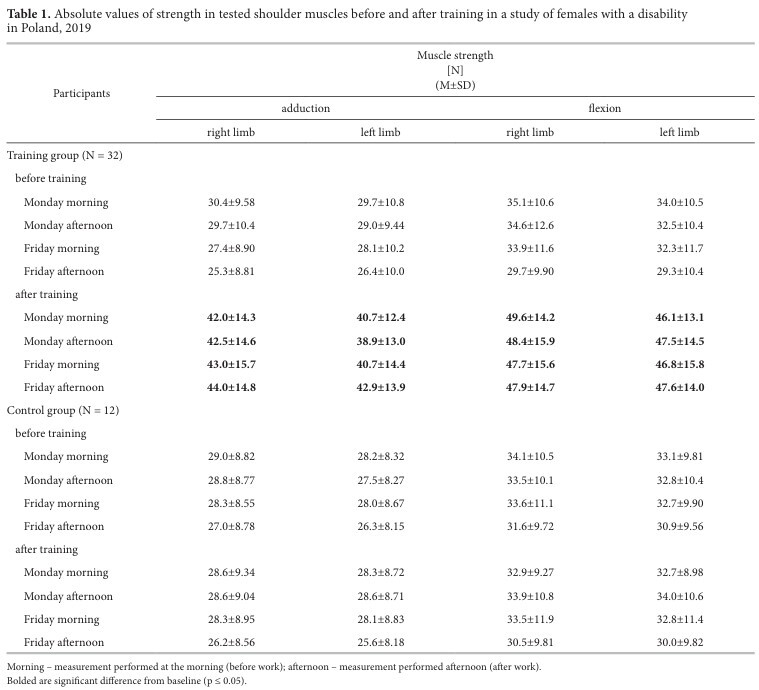Online first
Bieżący numer
Archiwum
Najczęściej cytowane 2024
O czasopiśmie
Zespół Redakcyjny
Komitet Redakcyjny
Polityka prawno-archiwizacyjna
Kup czasopismo
Klauzula informacyjna o przetwarzaniu danych osobowych
Deklaracja dostępności
Instrukcje dla Autorów
Instrukcje dla Recenzentów
Polecamy
Kontakt
Recenzenci
2024
2023
2022
2021
2020
2019
2018
2017
2016
2015
2014
2013
Redakcja i tłumaczenia
PRACA ORYGINALNA
The impact of inertial exercises performed in the workplace on shoulder muscles’ strength and muscles’ fatigue resistance in women with disabilities
1
Poznan University of Physical Education, Poznań, Poland
(Department of Physical Education and Sport, Faculty in Gorzow Wielkopolski)
2
Senior Plus Club, Osiedle Poznańskie, Poland (Department of Occupational Therapy)
3
Association of Lubusz Innovation Network, Gorzów Wielkopolski, Poland
(Department of Innovation)
4
Poznan University of Physical Education, Poznań, Poland
(Department of Biological Sciences, Faculty in Gorzow Wielkopolski)
5
Poznan University of Medical Sciences, Poznań, Poland
(Department of Developmental Neurology)
6
University of Zielona Gora, Zielona Góra, Poland (Institute of Health Sciences)
Data publikacji online: 26-03-2024
Autor do korespondencji
Alicja Naczk
Poznan University of Physical Education, Department of Physical Education and Sport, Faculty in Gorzow Wielkopolski, Estkowskiego 13, 66-400 Gorzów Wielkopolski
Poznan University of Physical Education, Department of Physical Education and Sport, Faculty in Gorzow Wielkopolski, Estkowskiego 13, 66-400 Gorzów Wielkopolski
Med Pr Work Health Saf. 2024;75(2):113-22
SŁOWA KLUCZOWE
DZIEDZINY
STRESZCZENIE
Background: Workers who do monotonous and repetitive work in a static position often complain about fatigue and decreased work efficiency. Some studies indicate that to improve muscle fatigue, resistance strength training can be used. Material and Methods: To investigate the effect of 4-week inertial training on shoulder muscles’ strength and muscles’ fatigue resistance 44 female workers with disabilities were examined. The participants were randomized into the training group (T) (N = 32) and the control group (C) (N = 12). Before the training and after that shoulder muscles’ strength were tested at the start and at the end of the workday (Monday and Friday). The participants were asked to complete questionnaire concerning their fatigue at work (T and C), inertial training and work efficiency (T). Results: The work performed during the last day of the workweek, i.e., Friday (before training) resulted in a significant decrease in shoulder muscles’ strength in T and C. Muscle strength achieved at the end of the workweek (Friday afternoon) was significantly lower than achieved at the start of the workweek (Monday morning) in both tested groups (before training). Moreover, inertial training resulted in a significant increase in shoulder muscles’ strength in T; 34–74% for different muscles. No changes in muscles’ strength were noted in C. Increased muscle strength in T following inertial training effectively prevented muscle fatigue. After training the differences in shoulder muscles’ strength noted in T during different times of the workday and workweek were insignificant. Moreover, 4-week inertial training increased significantly the work efficiency of women from T by 4%; no changes were noted in C. Inertial training was well tolerated by the participants. Conclusions: Using inertial training in women with disabilities to prevent shoulder muscles’ fatigue during the workday and workweek is recommended. Med Pr Work Health Saf. 2024;75(2):113–122
Udostępnij
ARTYKUŁ POWIĄZANY
Przetwarzamy dane osobowe zbierane podczas odwiedzania serwisu. Realizacja funkcji pozyskiwania informacji o użytkownikach i ich zachowaniu odbywa się poprzez dobrowolnie wprowadzone w formularzach informacje oraz zapisywanie w urządzeniach końcowych plików cookies (tzw. ciasteczka). Dane, w tym pliki cookies, wykorzystywane są w celu realizacji usług, zapewnienia wygodnego korzystania ze strony oraz w celu monitorowania ruchu zgodnie z Polityką prywatności. Dane są także zbierane i przetwarzane przez narzędzie Google Analytics (więcej).
Możesz zmienić ustawienia cookies w swojej przeglądarce. Ograniczenie stosowania plików cookies w konfiguracji przeglądarki może wpłynąć na niektóre funkcjonalności dostępne na stronie.
Możesz zmienić ustawienia cookies w swojej przeglądarce. Ograniczenie stosowania plików cookies w konfiguracji przeglądarki może wpłynąć na niektóre funkcjonalności dostępne na stronie.






